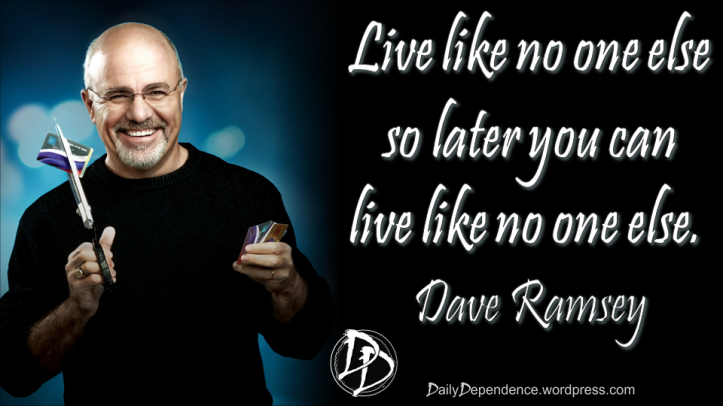I wrote last week about my criticisms of Dave Ramsey’s approach to finances from a financial point of view. Today, I want to share my concerns about his program from a faith perspective.
As a self-help guru, Ramsey needs you to feel guilty and ashamed but also empowered. After all, you have to believe that you are too stupid to handle your own money (because it couldn’t be economic forces that are shaping your financial situation) but also that you can be responsible for changing them. To do that, he stresses that you are responsible. You, you, you, you. If you just do things differently (“Tell your money where to go!”), then you will see different results.
But he also doesn’t ask you to be responsible for anything beyond your own financial situation. For example, he is pretty condescending about and dismissive of socially responsible investing (the idea that your investments should align with your values). About tracking how your money engages with the world, he says: “You can’t possibly track it all. It’s impossible.” And perhaps it is impossible to track it all, but certainly, you can track some of it. The fact that boycotts often work tells you that you can make your money change the world if you track how you use it. And some of us track a lot of it–both in our socially conscious investing practices and in how we choose to spend our money on services and consumer goods.
I hear Ramsey attempting to shift responsibility away from his own role in keeping evil companies alive in this explanation to a radio listener who asked about morally responsible investing:
It’s like I bought an old Chevrolet car the other day. When I bought that car, the guy who owned the car got the money. Chevrolet didn’t get the money. I’m not supporting Chevrolet by buying that car. You can’t say that by buying into a mutual fund that owns stock that somehow you’re supporting that company. You are profiting from that company making a profit while they do bad things. That part is bad. But the idea that somehow you’re giving this company money … You’re really not because Chevy didn’t get any of that check I gave that guy the other day. I got a Chevy car, but Chevy really wasn’t involved in the transaction.
But Ramsey is supporting Chevrolet by buying a used car. If a car doesn’t have decent resale value, people are less likely to buy it in the first place. This isn’t a tenuous relationship–most of us check the resale value of a car before we buy it.
So I see Ramsey preaching personal responsibility when it comes to how your financial decisions impact your life but not when it comes to how your financial decisions impact the larger world. I think Christians should have a broader vision.
Ramsey also supports the status quo. He likes what money does for him and is well-known for his massive house and car collection. He isn’t a critic of having too much. For a perspective on how to live with joy with what you have, I recommend More than Enough: Living Abundantly in a Culture of Excess. (For Joanna Harader’s great review of the book, click here.)
Ramsey also relies on some select Bible verses to preach a message of saving money that doesn’t always align with how I think Christians should engage the world. One of his favorite slogans is “Live like no one else so later you can live like no one else.” This seems to me to be a paraphrase of Luke 12:13-21, in which a man saves us his riches and then is able to relax and “eat, drink, and be merry.” For a Christian, I think, the purpose of money shouldn’t be to store it up now for later; it should be to use it now for what you value and use it later for what you value. For Christians, this should be to care for others and creation.

I also find him very insensitive to poor people. Ramsey encourages people to pare down their expenses, even if it means “beans and rice, beans and rice”–that is, even if they have to eat the food of the world’s poor. Simple, low-cost meals are considered to be a punishment for your past financial sins or a sacrifice for your future wealth. They are what you do until you don’t have to do them any more, not how most of the world lives, in part because of massive international inequality.
These things might not bother evangelical Christians, but I think they should.
Rebecca
PS. If you are looking for a book about finances that offers clear, practical advice, I recommend The Index Card.
